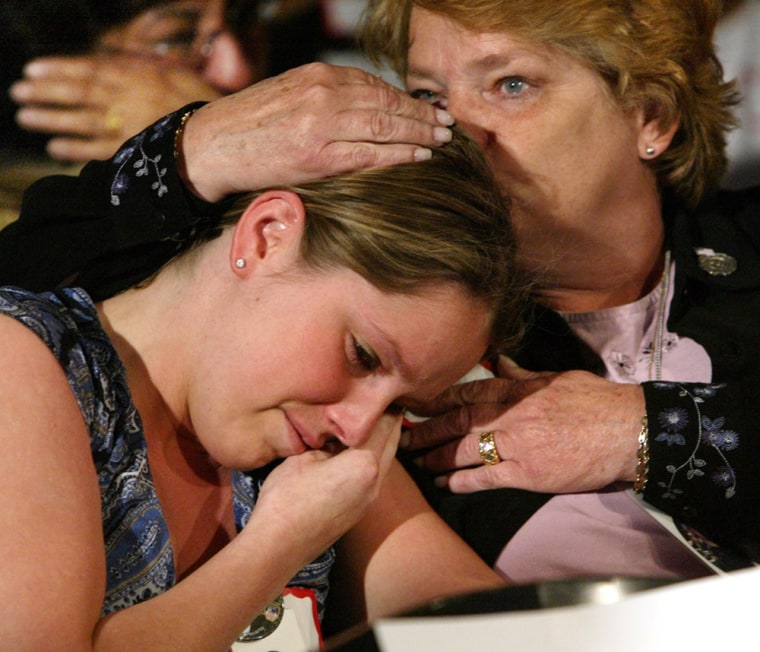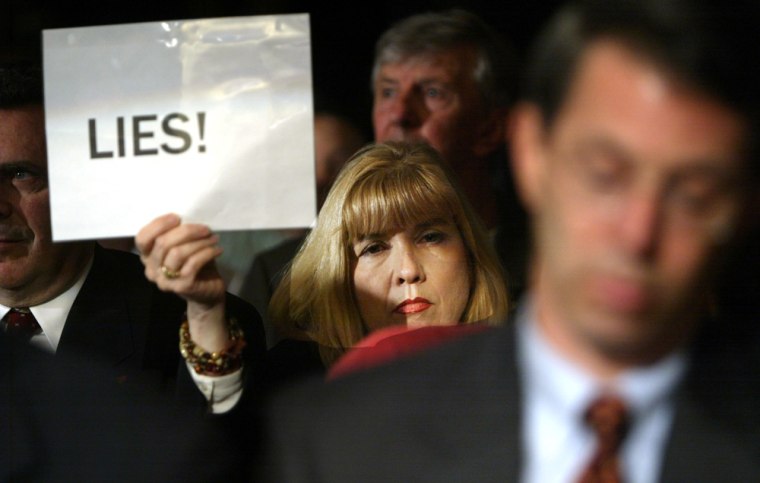The former police and fire chiefs who were lionized after the World Trade Center attack in 2001 came under harsh criticism Tuesday from the Sept. 11 commission, with one member saying the departments’ lack of cooperation was scandalous and “not worthy of the Boy Scouts.”
Commission members, in New York for a two-day hearing that was expected to be emotional, focused on how leaders of the two departments failed to share information effectively in the early frantic moments after two hijacked planes slammed into the World Trade Center.
Former fire Commissioner Thomas Von Essen and former police Chief Bernard Kerik shot back with infuriated responses to commissioner John Lehman’s questions, the strongest of a series of pointed statements from the panel.
“I couldn’t disagree with you more strongly,” Von Essen replied. “I think it’s outrageous that you make a statement like that.” Outside the hearing, he called the questioning “despicable.”
Families of Sept. 11 victims applauded the tough questioning and shook their heads sadly as the panel enumerated a litany of communication breakdowns between the departments. Family members sporadically mocked and booed Von Essen, Kerik and Richard Sheirer, former Office of Emergency Management commissioner, and they wept earlier in the day as they watched videotape of the buildings collapsing.
As Von Essen testified, Sally Regenhard — who lost her firefighter son — held up a piece of paper reading: “LIES.”
Decisions without information
A new report by the commission found that rescuers were forced to make rapid-fire, life-and-death decisions based on incomplete communications, contributing to the World Trade Center death toll of 2,749 people.
As the hearing got under way Tuesday, former World Trade Center director Alan Reiss told the 9/11 commission that he was unaware of the threat posed by Osama bin Laden until the summer before the attacks, and was not briefed by the FBI on key intelligence about Islamic terrorism.
Reiss said he did not blame the FBI for a failure to share intelligence, but rather felt anger at the 19 hijackers. Commissioner Bob Kerrey replied that there remained a “presumption that we may not be delivering the key information” to officials outside the FBI.
To the applause of family members, the former Nebraska senator said the 19 hijackers “defeated the INS, they defeated the Customs (Department), they defeated the FBI, they defeated the CIA.”
Disclaimer of pain
The emotional hearing, being held about 1½ miles from Ground Zero, began with a stark warning from the commission’s staff: “The details we will be presenting may be painful for you to see and hear.”
Scores of family members were in the audience as the commission showed footage of both hijacked planes slamming into the 110-story towers, along with videotaped testimony from survivors. As the footage showed the towers’ collapse, family members held hands and locked arms as they waited for the inevitable, many of them wiping tears from their eyes.
“For me, it was reliving what my mother heard, what she saw, what her last moments were,” said Terry McGovern, whose mother died in the World Trade Center's south tower.
In a minute-by-minute recounting of the second plane’s crash into the World Trade Center, commissioner Sam Casperson detailed how Port Authority workers were advised to wait for assistance on the 64th floor — and many of them died when the tower collapsed.
Communications breakdowns also prevented announcements to evacuate from reaching civilians in the building, Casperson said. One survivor of the attacks recounted calling 911 from the 44th floor of the south tower, only to be placed on hold twice.
‘Lack of awareness’
Emergency 911 operators had a “lack of awareness” about what was happening at the twin towers and were overwhelmed by the sheer volume of calls, Casperson said.
Reiss testified that a rooftop rescue of victims trapped above the floors where the planes hit was implausible.
“The roof was not a viable option,” Reiss said. In his written testimony to the commission, Reiss said the roof doors were locked because of federal regulations for antennae and other communications equipment.
Revisiting the jarring sights and sounds of the attack and its aftermath was a vivid departure from previous commission hearings. Some of the footage showed the confusing, rushed recovery efforts; family members shook their heads and sighed loudly at points during the recitation of those problems.
On the 81st floor
Stanley Pranmath recounted sitting in his 81st-floor office as the second plane veered toward his building, so close that he could clearly make out the letter “U” on the tail of the United Airlines plane.
“I dropped the phone, screamed and jumped under my desk,” he said, adding that rubble from the crash landed within 20 feet of his impromptu hiding place.
One critical issue — early public address announcements in Tower 2 telling workers to remain at their offices — was recounted verbatim by a survivor.
Brian Clark, president of Euro Brokers Relief Fund, recalled this announcement: “Building 2 is secure. There is no need to evacuate Building 2. If you are in the midst of evacuation, you may use the re-entry doors and the elevators to return to your office.”
The 26-page staff report offers no concrete explanation for the instruction, although it suggests two possible reasons: a concern for workers being injured by falling debris from the other tower, and the knowledge that in the 1993 bombing, many of the injuries were sustained in the crowded evacuation of the building.
The report also said that a fire chief failed to notice a critical second button on a device that carried radio signals up the buildings, leaving him to assume the equipment wasn’t working. It never failed, and was later used by other fire personnel in the south tower.
Other communications gaps included a lack of coordination between the police and fire departments, a crush of radio traffic that sometimes blotted out information, and an inability to share information effectively between on-scene officials and 911 phone operators.
Ineffective procedures
While many of the safety procedures put in place after the 1993 attack on the World Trade Center helped employees escape, others proved ineffective or possibly even dangerous in a very different type of attack.

In the years since the attacks, a rising chorus of New Yorkers has demanded a probe into the city’s emergency response. Yet, while the report found fault in a few instances, it largely sympathizes with officials and rescue personnel forced to improvise in the face of an unprecedented catastrophe.
Those testifying at the hearings are to include current and former officials of the Port Authority of New York and New Jersey; the New York fire, police and emergency management departments; the Homeland Security Department; and the Arlington, Va., fire department. Former Mayor Rudolph Giuliani was to testify Wednesday.
Last month, commissioners heard from President George Bush and Vice President Dick Cheney, former President Bill Clinton and ex-Vice President Al Gore, as well as national security adviser Condoleezza Rice, CIA Director George Tenet and Attorney General John Ashcroft.
